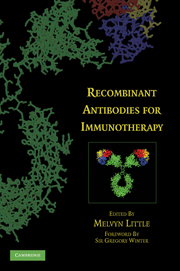Book contents
- Frontmatter
- Contents
- Contributors
- Foreword by Sir Gregory Winter
- Preface
- RECOMBINANT ANTIBODIES FOR IMMUNOTHERAPY
- PART I HUMANIZED ANTIBODIES
- PART II GENERATION AND SCREENING OF ANTIBODY LIBRARIES
- PART III TRANSGENIC HUMAN ANTIBODY REPERTOIRES
- PART IV ANTIBODY EFFECTOR FUNCTION
- PART V ARMING ANTIBODIES
- PART VI NOVEL ANTIBODY FORMATS
- PART VII ANTIGEN-BINDING REPERTOIRES OF NON-IMMUNOGLOBULIN PROTEINS
- PART VIII PROLONGATION OF SERUM HALF-LIFE
- PART IX INNOVATIVE IMMUNOTHERAPEUTIC APPROACHES
- 21 A Stem Cell–Based Platform for the Discovery and Development of Antitumor Therapeutic Antibodies to Novel Targets
- 22 Antibody Directed Enzyme Prodrug Therapy (ADEPT)
- 23 Immune Privilege and Tolerance – Therapeutic Antibody Approaches
- PART X MARKET OVERVIEW AND OUTLOOK
- Index
- Plate section
- References
21 - A Stem Cell–Based Platform for the Discovery and Development of Antitumor Therapeutic Antibodies to Novel Targets
from PART IX - INNOVATIVE IMMUNOTHERAPEUTIC APPROACHES
Published online by Cambridge University Press: 15 December 2009
- Frontmatter
- Contents
- Contributors
- Foreword by Sir Gregory Winter
- Preface
- RECOMBINANT ANTIBODIES FOR IMMUNOTHERAPY
- PART I HUMANIZED ANTIBODIES
- PART II GENERATION AND SCREENING OF ANTIBODY LIBRARIES
- PART III TRANSGENIC HUMAN ANTIBODY REPERTOIRES
- PART IV ANTIBODY EFFECTOR FUNCTION
- PART V ARMING ANTIBODIES
- PART VI NOVEL ANTIBODY FORMATS
- PART VII ANTIGEN-BINDING REPERTOIRES OF NON-IMMUNOGLOBULIN PROTEINS
- PART VIII PROLONGATION OF SERUM HALF-LIFE
- PART IX INNOVATIVE IMMUNOTHERAPEUTIC APPROACHES
- 21 A Stem Cell–Based Platform for the Discovery and Development of Antitumor Therapeutic Antibodies to Novel Targets
- 22 Antibody Directed Enzyme Prodrug Therapy (ADEPT)
- 23 Immune Privilege and Tolerance – Therapeutic Antibody Approaches
- PART X MARKET OVERVIEW AND OUTLOOK
- Index
- Plate section
- References
Summary
The majority of therapeutic monoclonal antibodies (mAbs) on the market and in development focus primarily on a limited set of targets selected on the basis of a few well-studied pathways. Truly novel targets (and their corresponding therapeutic mAbs) are rare and carry increased risk and challenges to develop because they, or the pathways they are involved in, are often neither well characterized nor extensively validated. The Raven therapeutic mAb discovery platform is especially efficient in discovering novel targets. Because the platform utilizes intact, living cells as the immunogen – and thus targets antigens present on the membrane of living cells – it is not biased upfront toward a particular protein, protein family, or signaling pathway. In addition, the presentation of these membrane targets in their fully processed and modified configuration and orientation in the living cell enables the discovery of mAbs to conformational epitopes as well as post-translationally modified epitopes. These epitopes may have greater tumor specificity and antitumor activity than those raised from less biologically relevant input such as purified or recombinant proteins and peptides. These epitopes can include binding sites on carbohydrates or lipids as well as conformational epitopes. In fact, the ability to discover these specific and active epitopes, not obvious when looking at mRNA or protein sequences, may open an entirely new class of antibody targets for cancer and other diseases. RAV12 is one example of a mAb that targets a carbohydrate epitope.
- Type
- Chapter
- Information
- Recombinant Antibodies for Immunotherapy , pp. 313 - 335Publisher: Cambridge University PressPrint publication year: 2009
References
- 1
- Cited by

